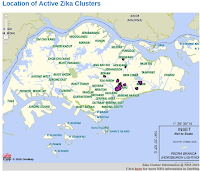#11,749
The latest update from Singapore's NEA continue to show a weekly decline in the number of Zika cases being reported in the city, with just 62 during the past 7 days and only 3 today.
Despite this encouraging trend, Zika poses a serious threat to the region due to their tropical climate, competent local mosquito vectors, the reintroduction of the virus from viremic travelers, and (in many regions) high population densities.
Over the weekend representatives of the 10 member nations of ASEAN (Association of Southeast Asian Nations) met via teleconference to discuss their response to the Zika threat. From their joint statement:
We, the ASEAN Health Ministers, agree to enhance our preparedness and response to Zika virus disease and other emerging and re-emerging diseases in the region by:
1. Strengthening in-country disease surveillance and leveraging on existing regional risk assessment mechanisms on Zika Virus Disease with the technical support of international organizations including WHO;2. Leveraging on the International Health Regulations 2005 (IHR, 2005) and other existing mechanisms to ensure relevant and timely information sharing with other member states for accurate risk assessment;
3. Enhancing the effectiveness of regional surveillance and response on Zika Virus Disease and other emerging and re-emerging diseases through the existing regional initiative mechanisms including ASEAN-EOC network, and ASEAN Plus Three Field Epidemiology Training Network (APT-FETN);
4. Taking appropriate measures to manage risks by intensifying vector control measures, ensuring access to diagnostic testing for Zika virus within our countries, including strengthening national laboratory network and communicating such risks appropriately;
5. Conducting research and sharing of new knowledge and best practices with regards to Zika Virus Disease, through relevant ASEAN-based cooperative mechanisms including APT-FETN, SEAMEO-TROPMED and also, other existing platforms including the Global Health Security Agenda (GHSA).
And this summary from the ASEAN website.
ASEAN Health Ministers respond to Zika virus
JAKARTA, 20 September 2016 – “The Zika situation should be seen as a driver for change in our approach to health care provision. Engaging with communities to promote health and well-being and encouraging shared responsibility for health is the most effective counter to public health threats such as these”, said H.E. Dato Seri Setia Dr. Zulkarnain Hanafi, Minister of Health, Brunei Darussalam and Chair of the ASEAN Health Ministers Meeting (AHMM). This was shared during the Special Video Conference of ASEAN Health Ministers on the Threat of Zika Virus in the Region yesterday.This video conference was conducted to respond to the need for a collective action to better prepare ASEAN Member States (AMS) against the threat of emerging and re-emerging infectious diseases including Zika virus disease. This is captured in the statement of H.E. Clinical Prof. Emeritus Piyasakol Sakolsatayadorn, MD, Minister of Public Health, Thailand. He underscored that “in the past several years, we (AMS) have faced several pandemics in our region and every time, the ASEAN Health Ministers react collectively in a timely manner. This has built up stronger regional capacity and trust. We are transforming these challenges and crisis into an opportunity to strengthen our collective capacity.”All ASEAN Health Ministers and their representatives, including the ASEAN Secretariat and the World Health Organization participated in the video conference to share global, regional and country situations as well as experiences on the Zika virus and its management.
The Joint Statement can be downloaded here.

